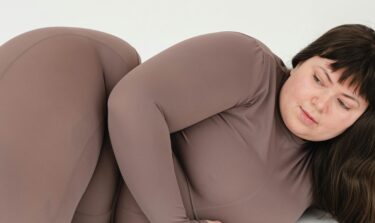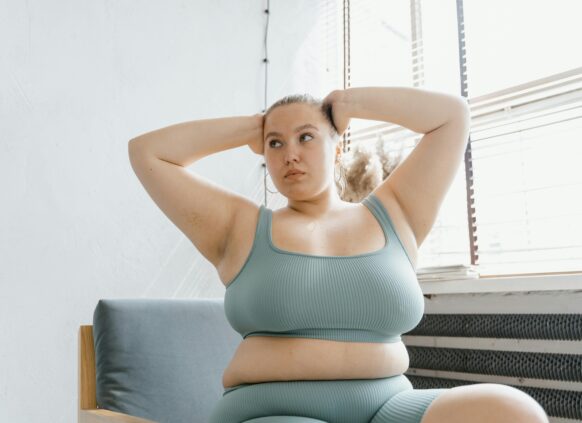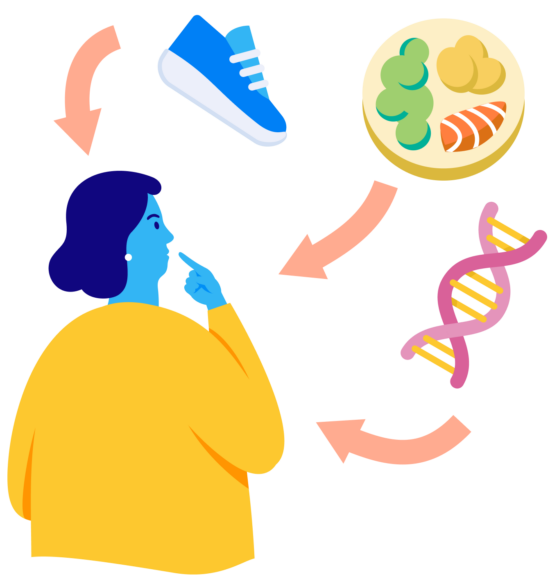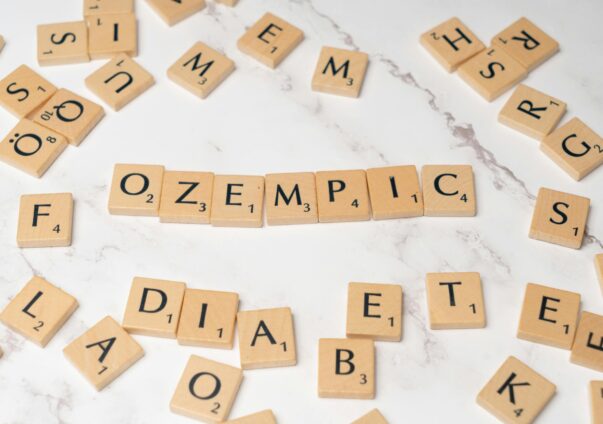
What is Ozempic face? And how to avoid it
Ozempic face refers to facial changes, like loose skin or hollowed cheekbones from fat loss. It’s caused by rapid weight loss, not the medication itself. However, these changes have become associated with drugs like Ozempic which can cause weight loss.
Ozempic is actually a type 2 diabetes treatment, not a licensed weight loss medication. Wegovy, which contains the same active ingredient, is prescribed for weight loss.
The good news? Ozempic face can often be prevented with gradual weight loss, healthy lifestyle changes, and professional guidance – like the personalised support offered through NHS provider Oviva.
Key Takeaways
- Ozempic face refers to facial changes like looser skin or more defined cheekbones.
- It’s not caused by Ozempic or weight loss medication, but by rapid weight loss.
- The best way to prevent Ozempic face is to lose weight gradually to give your skin time to adapt.
- Eating a nutritious diet, staying hydrated, managing stress, and getting enough sleep can also support skin health and help minimise changes in facial appearance.
What is Ozempic face?
Ozempic face describes facial changes that can happen after losing weight quickly – like more prominent cheekbones or looser skin. It’s not caused by the medication itself, but by rapid weight loss, which can reduce fat in the face.
Although the name comes from Ozempic, Ozempic isn’t a weight loss drug – it’s prescribed for type 2 diabetes. Wegovy, which contains the same ingredient (semaglutide), is the prescribed medication for weight loss.
These changes can happen with any method of fast weight loss – not just medication. That’s why gradual, supported weight loss is so important.
If you didn’t know that Ozempic isn’t prescribed for weight loss, find out more about the differences between Wegovy and Ozempic.

What causes Ozempic face?
Ozempic face is caused by fat and muscle volume loss in the face, along with changes to elastin and collagen in the skin – often the result of rapid weight loss.
When weight comes off quickly, especially around the face, your skin doesn’t always have time to adapt. This can make your bone structure more noticeable or affect skin texture.
A few factors can influence whether you notice changes to your facial appearance, including:
- How quickly you lose weight
- How much weight you lose overall
- Your age
- Your skin’s natural elasticity
These changes can happen with any rapid weight loss – including from diets or surgery – not just medication.
Slower, gradual weight loss gives your skin more time to adjust and may help prevent these effects.
Is it only caused by Ozempic?
Despite the name, there’s no evidence that Ozempic or weight loss medications like Wegovy and Mounjaro directly cause facial changes.
These medications don’t target fat cells or affect collagen in the face. They work by reducing appetite and helping you feel full for longer, which often leads to eating less and losing weight.
“Ozempic face” can happen with any form of rapid weight loss, including extreme weight loss diets and surgery.

What does Ozempic face look like?
Ozempic face can look different for everyone, but it’s typically associated with reduced facial volume and more defined features.
Some people notice changes around the cheeks, jawline, or under the eyes. Cheekbones may appear more prominent, and skin around the face may look looser.
Not everyone who loses weight experiences noticeable facial changes. If weight loss is gradual and supported by healthy lifestyle changes, you’re less likely to notice these hallmarks of Ozempic face.
How to avoid Ozempic face
If you’ve recently started weight loss injections, there are things you can do to reduce the risk of Ozempic face.
The best approach is to lose weight gradually. The NHS recommends aiming for 1–2 lbs per week (0.5–1 kg), which gives your skin more time to adjust as your body changes.
It’s also important to only take weight loss medication with medical supervision. Avoid simply buying Wegovy or buying Mounjaro online – unregulated products can be unsafe, and you won’t have the right support to help you manage the things you’re concerned about, like Ozempic face.

Nourish your skin from within
It’s essential to eat a balanced diet as you lose weight because you’ll eat less. You need to make sure that smaller meals still provide your vital nutrients.
Eating plenty of protein-rich foods is vital on your weight loss journey to support muscles and skin, reducing the risk of muscle mass loss in your face and body.
Good sources of protein include:
- Chicken or other lean meats
- Eggs
- Tofu, chickpeas, lentils and beans
- Fish
- Low-fat dairy foods such as cottage cheese
- Nuts and seeds
Staying hydrated is also important for skin health. Research shows that drinking more water is directly linked to improved skin elasticity. This could help reduce the chances of Ozempic face. Aim for around 8 cups of sugar-free drinks each day.
Support your muscles
When you lose weight, you’re not just losing fat – you can lose muscle too.
Resistance training, like lifting weights or using resistance bands, can help you build or maintain muscle while you lose weight. This can support your body shape and may help prevent facial hollowing.
Even if you’re new to exercise, small changes like doing bodyweight movements at home or lifting cans of food as weights can help you get started.

Managing stress (without adding more stress)
Managing stress isn’t always simple. But small moments of calm can make a difference – especially for the collagen in your skin.
If meditation sounds too far off, try this: breathe in through your nose for 4 seconds, hold it for 4, then breathe out slowly for 6. One or two rounds is enough to start.
You might also find stress relief in everyday things – listening to music, spending five minutes outside, or having a quick chat with someone. It doesn’t have to be perfect to be helpful.
Sleep: start where you can
Getting enough sleep supports your skin’s collagen production too – collagen that may break down if you lose weight too fast.
We know it’s not always realistic to get enough sleep – especially if you work shifts or wake often.
However, try small changes: dimming lights in the evening, turning off your phone earlier, or aiming to rest for 10 minutes more than usual. Even short daytime rests can help.
If sleep isn’t improving, it’s okay to ask for support. You’re not alone – sleep is part of your health, and help is available.

Get expert life that fits your life
Oviva offers personalised support with eating well, moving more, and building habits that last, provided through the NHS.
We’ll work with you to make small, realistic changes that fit your routine – and that may help reduce the chances of visible facial changes, like Ozempic face.
You’ll get guidance from a team who understands what you’re going through and can help you feel more confident along the way.
How to manage Ozempic face
If you’re experiencing changes to your face, remember to be kind to yourself, and remind yourself that there are so many health benefits to your weight loss journey.
That said, there are gentle ways to support your skin and overall wellbeing as your body changes.
Hydration and healthy lifestyle habits can help. Try to:
- Avoid alcohol and cigarettes, which can affect skin elasticity
- Eat a balanced diet, especially foods rich in lean protein to support your skin and muscles
- Focus on small, sustainable changes that nourish your body
While these habits may not reverse facial changes, they can help minimise them and give your skin what it needs to adapt gradually over time.

Other natural approaches to consider:
- Gentle facial massage and neck stretching to improve circulation and release tension
- Drinking 6 to 8 cups of fluids per day (as recommended by the NHS)
- Regular exercise to support muscle tone as you lose weight
- Getting enough sleep
You might also find it helpful to take an A–Z vitamin and mineral supplement, especially if you’re still building up to a more balanced diet.
If you’re unsure what’s right for you, speak to a healthcare professional for tailored advice.
Do cosmetic treatments help?
Some people look into options like fillers, skin treatments, or Botox. However, Oviva doesn’t recommend making drastic cosmetic changes.
Instead, we encourage a more natural first step: support your skin through good nutrition, hydration, sleep, and stress reduction. These changes can make a meaningful difference without the risks or costs of cosmetic procedures.
If you’re thinking about cosmetic treatment, always speak to a qualified medical professional first.

Should I be worried about Ozempic face?
Changes in facial appearance can feel unexpected, but they’re not dangerous.
Not everyone experiences visible changes – especially if weight loss is gradual and supported by healthy habits. You can often minimise facial changes with the right nutrition, hydration, and a balanced lifestyle.
It’s also worth remembering: the long-term health benefits of sustainable weight loss far outweigh any temporary changes in appearance.
If you’re concerned, you don’t have to go it alone. Oviva’s team of dietitians and health professionals can help you feel supported every step of the way. Or speak to your GP if you have questions.
Weight loss with professional support
The best way to avoid facial changes like Ozempic face is to lose weight gradually with personalised support.
If your BMI is over 35, you may be eligible for Oviva’s NHS-funded weight management programme. You’ll get:
- Tailored support from trained health professionals
- Access to the Oviva app to track your progress and stay connected with your team
- Guidance around lifestyle changes and, if suitable, access to prescription weight loss injections
You’ll be supported throughout your journey by a team who understands what you’re going through – and who’ve helped thousands of others reach their goals. That’s why Oviva is recommended by 97% of users!



